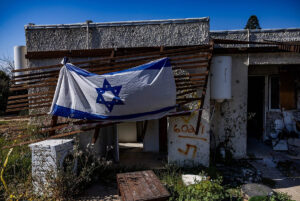Six months after October 7, a lament for the paths not chosen

Destroyed houses from the October 7 massacre in Kibbutz Kfar Aza, southern Israel, 7 April 2024
Haggai Matar writes in +972 on 18 April 2024:
Just over six months have passed since October 7, and life here in Tel Aviv has strangely returned almost completely to normal. But the fear has not gone away.
Since January, I no longer find myself stopping the car at the sound of a rocket siren, pulling out my 4-year-old son Carmel, and lying on top of him to cover his body. I don’t have to calculate which angle is best to shield him from any potential shrapnel flying in our direction, in the hope that it would only kill me and not him. I don’t have to pretend that we’re playing a game of “safe corner,” imagining his favorite TV superheroes protecting us, trying (usually successfully) to make him laugh, wondering how he would remember me if I died. That near-daily experience is no longer part of our lives here in central Israel.
And yet, after that horrific morning on October 7, it’s hard to restore any sense of security. So many things we thought we knew about this country turned out to be false. What once appeared to be a functioning state was in fact a hologram.
The stories of survivors of the Nova music festival, and of families in the southern kibbutzim — left defenseless for hours, begging for help, with hundreds ultimately slaughtered in their homes or in shelters — have weighed on me. The government’s abandonment of the remaining hostages, dying in captivity in Gaza, betrayed twice by their state, enrages me; everyone in Israel has imagined ourselves or our loved ones in that condition. To add to that, a regional war seems to be right around the corner; it certainly felt that way on the night of April 13, when we learned that a barrage of Iranian drones and missiles was on their way here.
The dread the follows me is very different from the one I grew up with during the suicide bombings of the 1990s and 2000s. The fear today is not just for my own safety or the safety of my family; it is of the destruction of the very society in which I live. Not the apartheid regime, which must be dismantled, but Israeli society itself: the people, culture, language, and human fabric that makes up life as I know it. I fear that, in the future, there won’t be anyone left to mourn us.
I know that this fear is not entirely rational; terrible things may still happen, but I don’t truly believe that everyone around me will be wiped out. Yet the fear is present in my heart, and it penetrates my dreams. There’s no escaping it because it is everywhere around me. I see it in Israeli news broadcasts, which make it seem as if the past half a year has been an endless October 7. I see it in a building not far from my house that is currently sheltering the displaced community of Kibbutz Re’im, which was attacked on that day. I see it in the faces of friends whose family members are among those murdered or kidnapped.
But this is only a small part of the fear that grips me. Because I’m also in tremendous, truly paralyzing horror at what our country is doing in Gaza. I feel a completely different kind of horror in that I understand better how terrible things are possible in the world, including October 7. I see how terror, fear, pain, and trauma can allow a nation to seal its heart and mind, while members of that nation commit unimaginable crimes against some collective “enemy,” even when the victims are innocents: babies and children, men and women, the elderly and the sick. It’s a black mirror whose reflection is impossible to bear.
I’ve barely been able to write due to the magnitude of the horrors that my country is responsible for in Gaza. I can’t fill my children’s bathtub without thinking about the thirst of Palestinian children living and dying only a few miles away. When I get in my car, I think of Hind Rajab, the 6-year-old Palestinian girl left to die alone for days in a car, surrounded by the lifeless bodies of her family members who were killed by Israeli tank fire. And I think of my friend in Gaza, who told me how he kisses his family goodnight every evening, not knowing if they will be alive in the morning.
“I have no place in my heart for the children of Gaza — I’m hurting too much for us,” is a line I have heard over and over again from Israelis in various forms. I understand where it’s coming from, but that doesn’t make it any less tragic or ominous for our future. Because if that’s how we feel after one deadly day in October, how can we even imagine what Palestinians feel after decades of constant expulsion, military rule, siege, oppression, imprisonment, and killing by Israelis? Or after six months of this vicious war?
So today, I write to those Israelis, and to the people who care about Israelis, who believe they have no place in their hearts for Palestinians in Gaza — to those who are afraid or angry, to those who think revenge is the solution, to those who are still willing to listen.
Catastrophe and failure
I belong to a small, left-wing, Jewish-Palestinian camp in Israel that has opposed this war from day one for a myriad of reasons.
